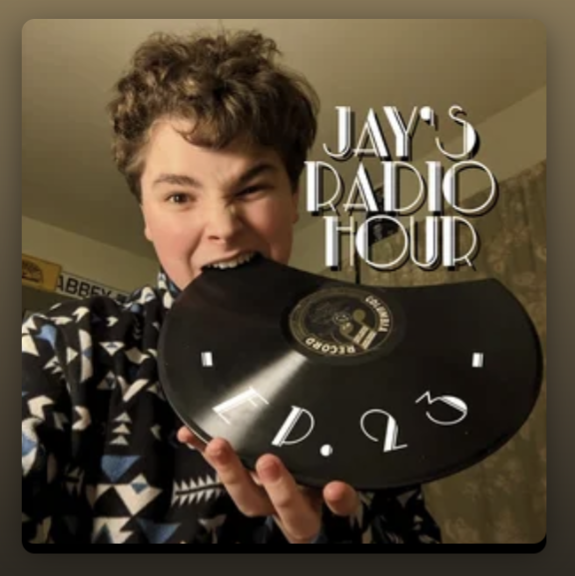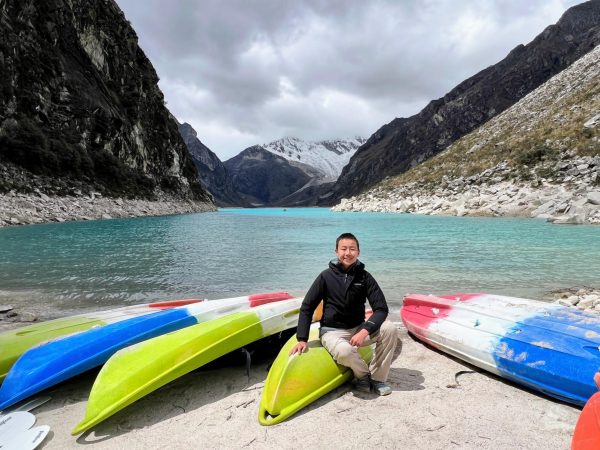
Four years ago, a soon-to-be Lakeside ninth grader appeared on a small local radio channel with a desire to talk about his unique interest: collecting old-fashioned discs with music from the 1920s and ’30s. I sat down with Jay B. ’27 to discuss radio shows and his love for old music.
Timothy D. ’27 (TD): I heard you got a radio show playing music from the ’20s and ’30s. Tell me about that!
Jay B. ’27 (JB): I should probably start at the beginning. I collect 78 RPM (revolutions per minute) records, which were killed off because they’re fragile, expensive, and can’t be played too many times. There are a couple hundred, maybe close to a thousand, collectors worldwide, and they make millions of these records. I have 800 in my room, plus about 5,000 that I just bought and am sorting through in the basement. I sell them on the side, too, but I mostly play them live on the radio.
I have an hour at 9:00 p.m. on Sundays on Space 101.1 FM to play them live on the radio. I play about 15 songs and talk about them — the recording history, the history of the format, and the performers. The records contain styles of music that are long gone, and they’re historical documents; they’re important for saving, and as I said, there are only a couple hundred – close to a thousand – of us who care to do it.
TD: Why do you collect discs, specifically those from the ’20s and ’30s?
JB: The music speaks to me. A lot of collectors say that the Great Depression killed off jazz, and I mean good jazz. Music very much changed after the Great Depression, especially jazz, country, and blues. For the first time in recorded history, it started to become about the record labels and the industry instead of the artist.
TD: How did you get your radio show?
JB: I started doing it when I was in fifth grade. I had my crappy little laptop microphone, and I had a turntable. I plugged my turntable into my computer and started playing records into the computer, talking about them, and posting them on an archive. I posted a couple of those on Facebook. I gained a little bit of traction. I found this cool, low-power radio station. And I wrote them a letter saying, “Hey, I got a radio show. Do you want to broadcast it?”
The guy said, “Make us a test episode.” So I went into their studio and made an episode with their professional equipment. My dad helped me out with that one. He still helps me out to this day with radio show stuff. The station manager liked it, and now, every Sunday, we go in and do it live.
TD: When did you first come up with the idea for a radio show?
JB: It has always been kind of in the back of my mind. I love to share music, especially music that it seems like the world has forgotten about. I used to make cassette tapes for people with a cassette deck and records. It kind of evolved over time to where I would post them online and then talk about them.
TD: More on your show — what’s your favorite episode that you’ve done?
JB: I think the real magic doesn’t happen with one specific episode. The real magic happens with live radio. I feel like you can hear the fun that I’m having through the radio. And when it’s happening in real time, it’s such a magical moment because anyone can tune in and hear exactly what’s happening in the studio at a three second delay. That’s something we’ve lost with pre-recorded radio shows, so I try to keep it old-school. So, I know it’s going to sound a little lame, but every episode is my favorite episode, except for a select few that I think I was really phoning it in on.
TD: Do you have any focus or ideas on expanding?
JB: Expanding? I mean the radio station is growing. It’s a slow growth, though. I want to go to KEXP or someplace that has the same morals in line with what we do, but no — I’m pretty set on Space 101.1. We might be able to grow our wattage. We’re certainly growing [in] listenership. I think this year we were up 15% compared to last year. I’ve only been at the station for, like, two years, but my show is growing along with it. Eventually, I’ll hopefully get more followers on Spotify. For growth, it’s really gonna be to keep doing what I’m gonna do. The show will evolve like it already has. We’ll see where it goes.
This interview has been edited for clarity.
Spotify Page:
https://open.spotify.com/show/6PLnHIwaFBKbUojNasfbOe?si=923f3f5f4df2487a


